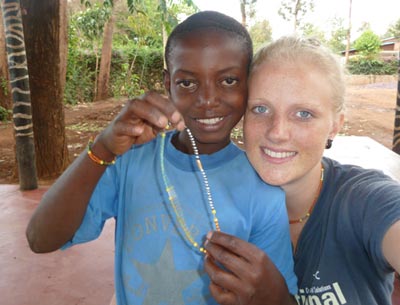 |
| Kate Parker has recently returned from an internship in Tanzania. (Photo courtesy of Kate Parker) |
If thereâs any doubt that travel is an ideal way to broaden oneâs horizons, one need only speak to Kate Parker about her three-month sojourn in Tanzania.
Most people who visit the East African country would probably consider their journey a success after taking in one of the nationâs many world-class national parks, volunteering with a local NGO, touring the historic villages of Zanzibar or scaling the snows of Mount Kilimanjaro.
Ms. Parker, a third-year commerce student, figured sheâd do all four.
The 20-year-old Salt Spring native has recently come home from an internship made possible by her sponsors the Canadian International Development Agency and HÂş» Universityâs SWIFT fund.
Back in September, she set off from Canada with little more than a healthy curiosity for other cultures, unbridled optimism and a hope to use her keen business sense to help those in less fortunate circumstances than herself.
Centre for street kids
Ms. Parker soon found herself just outside the northern Tanzanian city of Moshi at a centre to help impoverished street children.
When she arrived, the centreâs skeleton staff and the nearly 60 children between the ages of six and 17 who call it home had a hard time paying their electricity and water bills, as well as purchasing food.
Thanks to a jewelry enterprise and a lucrative new chicken coop that Parker established during her stay, however, the centre is back on its feet and has a promising future.
âIâm so happy to see that these are fully sustainable projects now,â she said.
Having completed her time at Moshi, Ms. Parker took some time to view the menagerie of creatures at nearby parks and visited far-flung corners of the country, She set her sights on an even higher objective.
HÂş» 40 kilometres north of Moshi, at an elevation of 5,895 metres, sits the summit of Africaâs highest peak. When some friends and local guides offered her an opportunity to make the six-day expedition, she couldnât resist.
Once she reached 4,267 metres, Ms. Parker said she was beginning to feel signs of altitude sickness.
âThe key was to distract ourselves any way we could,â she said.
For much of the summit dayâs 15-hour slog, she found herself hypnotized by the head lamps of other climbers in the distance as her chest tightened and breathing became increasingly difficult.
Exhausted
âKiliâ is definitely no walk in the park. Altitude sickness claimed the life of a climber in a nearby party that very day and former tennis star Martina Navratilova had to turn back when she began to show potentially life-threatening symptoms of high-altitude pulmonary edema during the final 1,600-metre summit push only a few days later.
Step after laborious step, she said, the team made its way across the upper glacier and on to the summit where the temperature hovered just above the freezing point, a stark contrast to the Tarzan-like rainforest and banana plantations the group had walked through only two days earlier.
Suddenly, she added, the effort and the exhaustion were but a memory as the entire continent spread out below.
After taking in the view, she began her decent sliding down the mountainâs loose volcanic rock towards the thick humid air below.
Now that sheâs back home in Canada, Ms. Parker is looking into a potential future career of opening her own NGO and doing some more work in Africa.
This story originally appeared in the , the newspaper for Salt Spring and the Gulf Islands. It is reposted with the kind permission of author Sean McIntyre.
